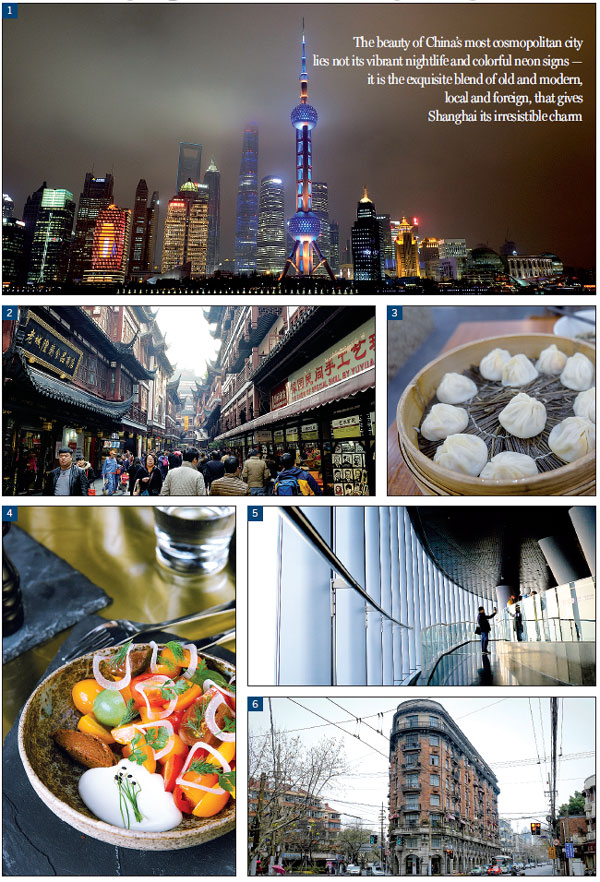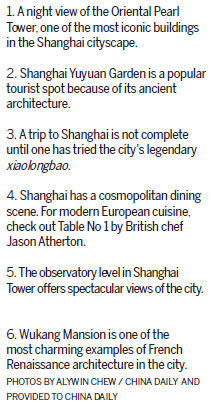Blended contrasts


The beauty of China's most cosmopolitan city lies not its vibrant nightlife and colorful neon signs - it is the exquisite blend of old and modern, local and foreign, that gives Shanghai its irresistible charm
Everywhere you go in Shanghai, the dissonance that stems from the obvious dichotomies of sophistication and squalor is one that enthrals instead of confuses.
Dingy alleyways and decrepit old shikumen buildings are juxtaposed by glitzy shopping malls and towering skyscrapers, while grotty hole-in-the-wall eateries and roadside stalls can be found alongside trendy cafes and hip cocktail bars.
Shanghai has long been China's most cosmopolitan city. Following the end of the First Opium War in 1842 and the signing of the Treaty of Nanking on Aug 29 that year, Shanghai was opened up to British merchants and subsequently those from other Western nations such as France, Germany and the United States.
The resulting influx of foreigners provided the city with an infusion of different cultures and had also quickly transformed it from a sleepy fishing village into a hub for maritime trade.
Today, Shanghai is the world's busiest container port and one of the key engines in China's rapid economic growth over the past few decades. But though it may now be regarded as a modern and progressive Chinese city where trends are set and landmark national policies are introduced, Shanghai's old world charm is still very much intact.
Beguiling architecture
While it has been more than 170 years since the Westerners first carved out their own concessions across the city, the imprints of this smorgasbord of cultures is still evident, particularly in the architecture, which is undoubtedly one of the most captivating aspects of Shanghai.
Wukang Mansion (1850 Central Huaihai Road), formerly known as Normandie Apartments and the International Savings Society Apartments, is a one-of-a-kind property in the city that is reminiscent of New York City's Flatiron Building. Designed by Laszlo Hudec, a renowned Hungarian-Slovak architect, and built in 1924, the building is one of the prime examples of French Renaissance architecture in Shanghai.
Wukang Mansion has throughout history been home to numerous high-profile personalities such as acclaimed Chinese actor and director Sun Daolin and actress Shangguan Yunzhu who had notoriously committed suicide by jumping off the seventh floor. While the property was restored by the district government in 2008, the facade is still charmingly rustic.
Located right across Wukang Mansion is another historic venue worth visiting - the memorial residence of Soong Ching-ling, the wife of Sun Yat-sen, the founding father of the Republic of China. Most of the original furnishings in this elegant Western-style home have been left untouched and visitors will feel as if they have journeyed back in time within this space. More details about Soong's life can also be found in the adjacent exhibition hall in the same compound.
Over in Jing'an district, the Shanghai Exhibition Center is an example of neo-classical architecture from a bygone era. Built in 1955 to commemorate the relationship between China and the Soviet Union, the regal building features a long spire which makes it stand out in the landscape. The center has held numerous international exhibitions over the years.
Along the famous Bund stretch that overlooks the Huangpu River are a number of other impressive neo-classical facades. One of the most prominent buildings is the HSBC Building which was designed by British architecture firm Palmer & Turner Architects and Surveyors and built in 1923. The property was previously used by the Shanghai branch of HSBC and the Shanghai municipal government. Today, it houses the Shanghai Pudong Development Bank. It was also once the second-largest building in the world.
Authentic Shanghai
Though Shanghai has a reputation for being a fast-paced city, the bustle drops a few notches in the former French Concession where the ubiquitous French plane trees that flank the roads create a romantic atmosphere. This is especially so during autumn when the roads and street paths are transformed into a brilliant carpet of red and yellow leaves. Taking a stroll while taking in the sights of daily Shanghai life along these roads is a popular activity even amongst the locals.
For a glimpse into the more gritty parts of the city, take the metro and exit at Xiaonanmen (Line 9). Here, you'll find tiny old homes, wet markets, street vendors and elderly residents watching the world go by on their rattan chairs or indulging in a game of mahjong.
If you're looking for beautifully restored ancient architecture that dates back to past dynasties, head to Yuyuan Garden between Remin Road and Zhongshan Road where dozens of street vendors selling snacks, souvenirs and antiques can be found.
For a glimpse into the typical leisurely activities of the locals, make your way to Fuxing Park. Everyday, just before the sun sets, scores of middle-aged women gather to dance alongside taichi practitioners and groups of elderly men admiring their song birds.
Another one of the most interesting places in Shanghai is the famous "marriage market" in People's Square where hordes of parents tout their children, who are not actually present, to other parents. Visitors to this makeshift market space, which exemplifies how this supposedly old world ritual of arranged marriage still exits in this modern age, will find dozens of umbrellas being used as postboards containing personal information as well as details such as monthly income, occupation and whether the person owns a car or a house. The market only takes place on weekends.
A touch of modernity
Named a national historical and cultural street by the State Administration of Cultural Heritage in 2011, Wukang Road is where the chic Ferguson Lane complex is situated. Here, travelers will find trendy boutique stores, art galleries and cafes set in old building complexes that have been given a modern makeover.
Another well-known example of gentrification is Tianzifang (210 Taikang Road), where travelers can find restored shikumen buildings, the predominant form of housing for locals from the 1860s to the 1930s. Easily identified by its exposed brick facades, this architecture style is said to be a combination of Chinese and Western elements.
While Tianzifang is today a perennially crowded tourist hotspot that contains a slew of bars, cafes, souvenirs stands, retail stores and creative spaces, it is nevertheless still worth a short tour to see how historic buildings in Shanghai have been expertly preserved and adapted for contemporary needs.
One of the most obvious examples of Shanghai's modernity are the main shopping streets in the city, Huaihai Road and West Nanjing Road, which are home to a galaxy of luxury brands. Almost all the stores boast glitzy window displays, some of which even span two levels. For younger fashionistas who are seeking out independent labels, Changle Road, Xinle Road and Julu Road are some of the most popular destinations.
Across the Huangpu River from the Bund, Shanghai Tower is perhaps a befitting symbol of the city's modernity and ambitions. The second-tallest building in the world behind the Burj Khalifa in Dubai, the Shanghai Tower has an observatory on the 118th floor as well as an exhibition area detailing some of the tallest buildings in the world. While there is usually a long queue to enter the observatory, the utterly breathtaking views of the city is well worth the wait.
Eat
Being the most cosmopolitan city in China, Shanghai's food scene is naturally diverse and chock-full of restaurants serving cuisines from around the world.
For those seeking a big, hearty Western breakfast, consider having brunch at Mr Willis (Level 3, 195 Anfu Road) which offers Australian fare including poached eggs with hollandaise and omelets stuffed with chorizo.
Alternatively, Table No 1 (No 1 to 3 Maojiayuan Road) at the Cool Docks area serves European style brunch in intimate, minimalist settings. Housed within The Waterhouse, one of the choicest hotels in the city by Singaporean hotelier and restauranteur Loh Lik Peng, Table No 1 is British chef Jason Atherton's first dining establishment in the city.
In terms of a local breakfast experience, one cannot go wrong with xiaolongbao, the quintessential local snack that's been elevated to an art form in certain establishments.
At Jia Jia Tang Bao (90 Huanghe Road), arguably the city's most renowned hole-in-the-wall institution for this delicate soup dumpling, customers are hardly ever left dissatisfied. If you'd prefer slightly cleaner surrounds and shorter queue times, head to their sister establishment Lin Long Fang (10 East Jianguo Road).
For modern local cuisine, check out Old Jesse on the third floor of IAPM mall (999 Central Huaihai Road) that's home to a host of luxury labels and fast-fashion brands. Be sure to order the opium fish as well as the hongshaorou, perfectly braised pork with a layer of fat that melts in your mouth.
If you're looking for a more extravagant modern Chinese culinary experience that blends flavors from the country's eight regional cuisines with modern cooking techniques, make a reservation at Bo Shanghai (20 Guangdong Road), a sister establishment of the Michelin-starred Bo Innovation in Hong Kong by celebrity chef Alvin Leung.
The restaurant, hidden behind a wall within Daimon Bistro on the sixth floor, only offers a 10-course tasting menu that features masterfully reinvented Chinese dishes such as a deconstructed xiaolongbao and truffle-infused buns. Service is impeccable.
Stay
Travelers looking to stay in hotels of unique old world architecture can consider the Heng Shan Moller Villa Hotel located on South Shaanxi Road in Shanghai's Jing'an district.
Looking as if it came straight out of a Harry Potter movie, the castle-like building was first built in 1936 by Swedish shipping tycoon Eric Moller and features Norwegian and Oriental elements. The property, which used to be Moller's private residence, has since 2002 been operating as a boutique hotel.
The Fairmont Peace Hotel, an award-winning establishment along the Bund that dates back to before World War II, is another building in the same vein.
This famous hotel, which has throughout its illustrious history hosted numerous world leaders and celebrities such as acclaimed playwright George Bernard Shaw and comedian Charlie Chaplin, features brilliant Art Deco-inspired interiors that pay homage to this style of visual arts which came into prominence in the 1930s. Shanghai is till today still widely recognized as one of the world's largest repositories of art deco architecture.
alywin@chinadaily.com.cn
















